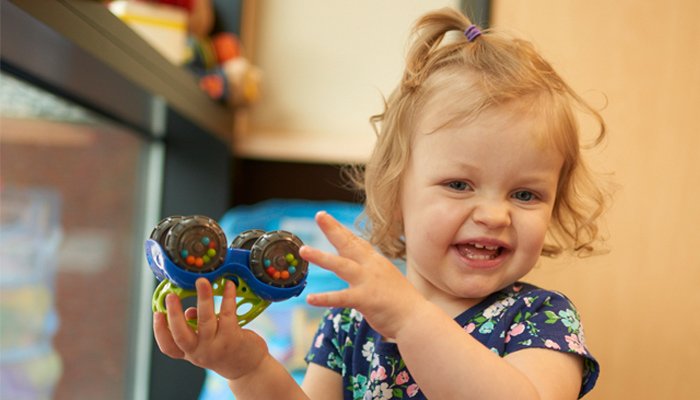Understanding Toddler Behavior 101

Toddlers are so adorable! Well, most of the time they are! Toddlers are in a stage of rapid growth and exploration. They are absorbing their world, while at the same time stretching–sometimes painfully–our nerves. Toddlers can be a handful for any parent, no matter how patient you may be. It is a mighty big and overwhelming world for such a small person. Sometimes it helps to see the world from your toddler’s point of view to gain an understanding of what your child is going through.
Throwing Temper Tantrums
Toddlers are at a stage where they are beginning to understand what you are saying, but they do not have the ability to express themselves verbally by piecing thoughts and words together. Since they desperately want to convey their thoughts but are limited, they can get frustrated. Many toddlers throw temper tantrums every now and then, which can come out as an extreme outburst of foot stomping, body squirming, running rampant, and more. Depending on why your child is upset, tantrums should be handled in different ways. Sometimes a child may need to be comforted during a tantrum, while other times, it is best to walk away, ignore the outburst, and give your child some space. Often times using a distraction can help. By getting your child interested and engaged in something else, it can help to ease the situation they were frustrated about.
Biting
Toddlers may bite for a variety of reasons, including teething, being over- or under-stimulated, space issues, or a quick fix to get a reaction out of whomever they are biting. It could happen when another child steals a toy or if they do not get their way. It gives them a sense of power to draw this reaction, and boy, can it hurt! Monitor the biting habit and try to “nip it in the bud” immediately. This is a good scenario in which to sternly use the word “no” or to say “no teeth!”
Mine!
Toddlers are very egocentric and do not consider or understand the concept of sharing. If your toddler sees a child with a toy they want, they may grab it, not realizing the consequences. All you can do is teach them what is appropriate behavior, and over time, they will learn to take turns. You may opt to tell them that it is “my turn, then your turn” rather than saying “share.” Waiting is a challenge for toddlers, so avoid making them wait too long, and then increase the time as they develop.
Time
Your toddler will not understand when you tell them you will go outside to play in ten minutes. They have no concept of that time frame and will become confused and frustrated when they try to do it immediately and you repeat, “I told you in ten minutes!” Use an alternate tactic such as, “When Mommy is done washing the dishes we can go outside and play.”
Prepare Them
Did sitting on Santa’s lap terrify your child instead of excite them? It is not every day a strange, big, round man in a bright red suit with white fur covering his face walks around for them to see and experience. Before taking your child to these types of events, prepare them. Show them pictures and tell them stories. Let them know what they are about to see. It may help calm their anxiety when the event takes place.
Imitating You
If you are doing it, why can’t I? Your toddler is trying to learn independence and imitate your many moves. If you are folding laundry, your toddler may think they are helping by taking it back out of the basket. Teaching your toddler “no” or “do not touch” should be reserved for safety issues. Be patient with your toddler and let them experience their way of helping. It may cause you more work, but it will cause less frustration for them. Success for both of you may be to give your toddler their own laundry basket of socks to match and “fold.”
Throwing Things
After awhile, you get used to your toddler testing the laws of gravity by dropping things from the high chair and leaning over to see how they fell. It can even be pretty cute at times. Then they learn to throw things, which mostly is just for fun, but when they start to throw things during a fit of rage at other toddlers or even at you, then it is not so cute anymore. If you see your toddler throwing things, give your child something appropriate to throw like a soft ball or crumpled newspaper and tell them that these are the only things they can throw.
Playtime
Toddlers are typically more active at this age than at any other time in their lives. Much of their play involves figuring out how things work, such as taking things apart and putting them back together. They are generally quite independent and self-centered and enjoy playing near other children or adults, but not always with them. Toddlers feel safe to explore and try new things when they feel secure in their environment and with their caregivers.
Activities
Toddlers need to investigate, carry things, fill things, bang on things, climb on things, sing, talk, and laugh every day. Here are some ideas for wonderful toddler activities that you can start today, and best of all, they are free!




What a great article. There are a lot of wonderful activity ideas to help me navigate toddler behavior.
This is a great article. Thanks for all the useful information.